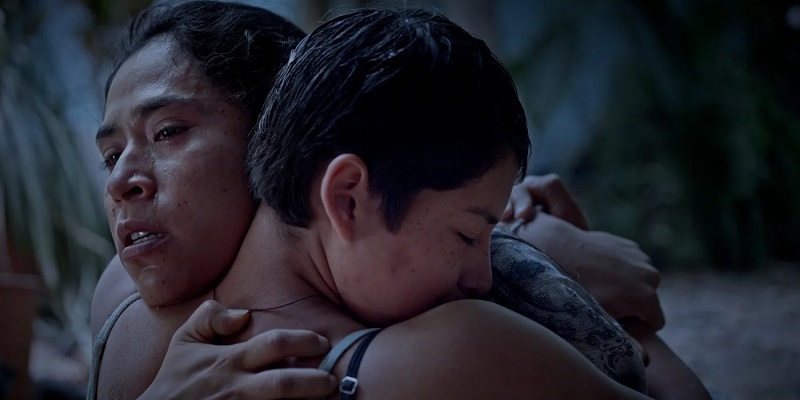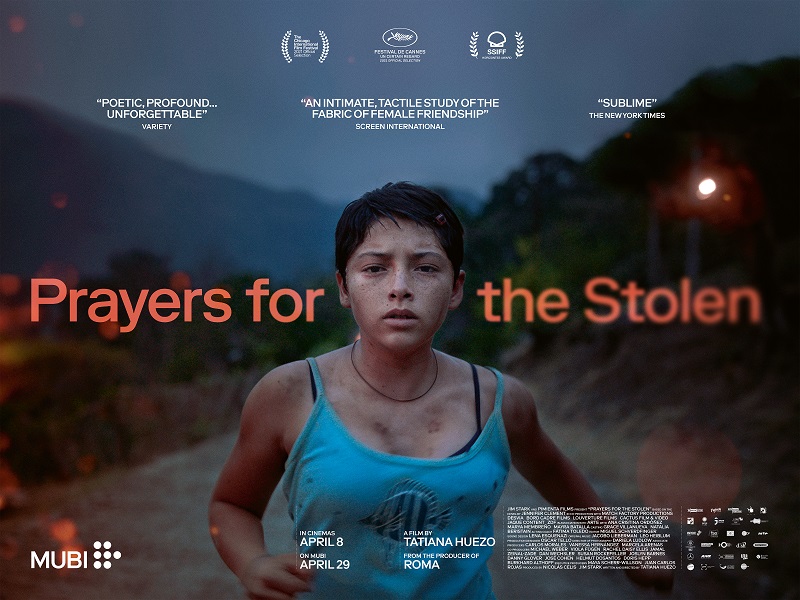
Review by
Eric Hillis
Directed by: Tatiana Huezo
Starring: Ana Cristina Ordóñez González, Mayra Membreño, Mayra Batalla, Alejandra Camacho, Memo Villegas

From 2011's Miss Bala to the recent
La Civil, several Mexican movies have examined the impact of that country's
notorious drug wars through the prism of such conflicts' effect on
women. With Prayers for the Stolen, writer/director Tatiana Huezo continues this trend, though
there's no revenge narrative at play here. The women of her film are
victims in waiting, with the threats of the cartel lurking off screen
throughout like an incoming fog bank.

Like recent dramas
1982
and
Belfast, Prayers for the Stolen presents life in what is
essentially a war zone through the innocent eyes of a child just
attempting to live their life. Played initially as a child by
Ana Cristina Ordóñez González and later as a young teen by
Marya Membreño, the central figure is Ana. She lives in what
should be one of the world's most idyllic regions, a village in the
mountains of the state of Guerrero. Stepping outside her door, Ana is
treated each morning to the sort of splendid view wealthy people splash
out to experience on their summer holidays. Were it not for the threat
of abduction by the sex trafficking cartels, it's hard to think of a
nicer place for a young girl to live out her childhood.
But that threat is sadly very real. While the young Ana and her friends
are largely oblivious, it occupies her mother Rita's (Mayra Batalla) thoughts, and those of the village's other mothers. With the menfolk
either working across the border or already dead, the village's women
are left to defend their children from the predatory cartels. When
mothers see their daughters donning lipstick for the first time, they
often react angrily, afraid of losing their child to impending
adulthood. Here, this metaphor takes on a very real significance. Seeing
Ana wearing an improvised beetroot lipstick, Rita reacts in horror, for
she knows that her daughter will soon be seen as a sexual being in the
eyes of the cartel.

Desperate to save their daughters, the mothers of the village shave
their heads under the pretence of tackling lice. One young girl with a
deformed lip, and thus considered safe from the attentions of the
cartel, is allowed keep her hair, but later when her lip is healed by
surgery, it spells potential tragedy. There's a cruel irony as to how
the girls of this community are forced to grow up quickly in terms of
being streetwise and taking on adult jobs, while every effort is made to
combat the onset of puberty and the attention of men.
That Huezo keeps the threat largely off screen, spoken about in hushed
tones by adult women, makes it all the more real. Much of the movie
plays like a traditional coming-of-age tale, as young girls don make-up
and talk about crushes on teachers, but the narrative makes us terrified
of the day when these girls will be viewed as having come of age.

As we've come to expect from recent Mexican cinema,
Prayers for the Stolen is beautiful to gaze upon, with
Huezo and cinematographer Dariela Ludlow creating dreamlike
sequences that wouldn't be out of place in the work of their compatriot
Carlos Reygadas. There are images that are strikingly beautiful and some
that are chilling. Early on we see children covered in white ash in the
aftermath of a quarry detonation, an image later echoed when an
unfortunate girl is caught outside during the spraying of a pesticide.
Such interconnected images remind us that along with the threat of the
cartels, the locals of this area have to contend with the debris of
capitalism and progress raining down on their homes.
Prayers for the Stolen never feels like it's begging for
attention, but it's hard not to view the film as a plea for help from a
proud, forgotten people.


